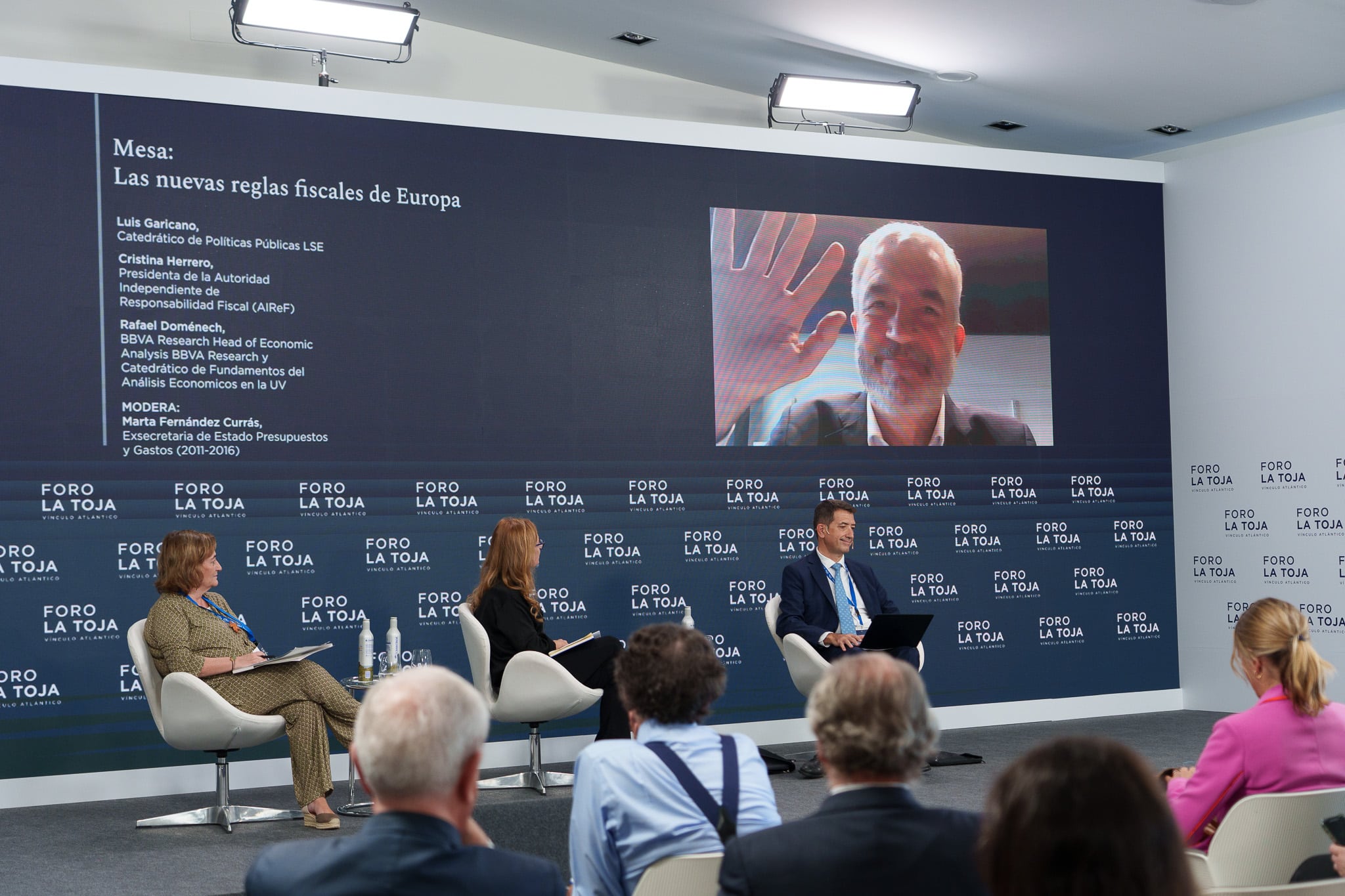
The President of the Independent Authority for Fiscal Responsibility, Cristina Herrero, took part earlier today in the La Toja Forum in a month of debates on the fiscal rules, at which she stressed the need to exploit the potential of fiscal institutions like AIReF in the reform of the fiscal framework currently under debate in the European Union. Cristina Herrero was accompanied at the round table by former State Secretary for Budgets, Marta Fernández Currás, the Chief Economist for Developing Economies at BBVA Research, Rafael Doménech and the economist Luis Garicano.
The President began her speech by considering that the new framework is a “significant improvement” on the previous framework thanks to two “essential” elements: the change of focus on supervision, which no longer revolves around the fiscal imbalance and structural deficit but focuses on primary expenditure net of revenue measures; and the commitment to strengthen national fiscal frameworks and the role of Independent Fiscal Institutions (IFIs) like AIReF.
As regards the first element, the President of AIReF considered the change to be “fundamental”, because it abandons the “obsession” with a deficit limit regardless of how it is reached. Until now, governments could comply with this target for a specific year based on extraordinary revenue because no heed was paid to the underlying reality of the public finances. Furthermore, the target defined in structural terms was subject to methodological changes and revisions due to the difficulty of the calculation, which meant that a country could go from a situation of complying with the targets to not complying with the targets in just a few months.
In this context, she considered that primary expenditure net of revenue measures is a significant improvement, which also leaves governments with a certain margin and capacity to increase this limit on spending if revenue measures are adopted or to restrict it in the event of opting for fiscal reductions. The core element of the new framework is sustainability, she argued, which forces countries with debt in excess of 60% to present four- or seven-year fiscal plans that must ensure that debt is placed on a downward path for the following ten years. Once this path is set, spending commitments are established that are subjected to fiscal supervision.
According to Cristina Herrero, this new approach to supervision has several positive effects, the first of which is to place the focus on medium-term orientation, thus overcoming the short-termism that prevailed until now. It also facilitates the formation of fiscal cushions and allows a certain imbalance in situations of economic weakness, thus providing fiscal policy with a counter-cyclical character. And lastly, this improves transparency, because primary expenditure net of revenue measures is an observable variable which, once set, leaves less room for discretion.
THE NATIONAL FISCAL FRAMEWORK
As regards the second element, Cristina Herrero explained that, despite the importance of a good framework of fiscal rules at a European level, a need exists to strengthen the national fiscal framework such that the commitment to stability and financial sustainability “hails from within”. In this regard, she praised the European Commission’s proposal to amend the directive on national fiscal frameworks, strengthening the medium-term orientation, budgetary data, coordination between the different General Government sub-sectors and the role of IFIs which, in her opinion, could prove to be an “integrating nexus” between the European fiscal framework which is sometimes perceived as distant and the commitments and political will of the national fiscal framework.
Cristina Herrero regretted losing the chance to modify the national framework independently from the European negotiations. “We have now arrived late”, she argued, after indicating that we already knew that some things could be improved on without waiting for Europe, as AIReF has recommended on several occasions. She specifically referred to aspects of coordination and the distribution of deficit targets among the different General Government sub-sectors regarding which, in her opinion, the Autonomous Regions should also participate. She also recalled that the reform of the financing systems is still pending, as is finding a solution to extraordinary financing mechanisms.
WEAKNESSES
Despite considering that the reform was necessary and that the Commission’s proposal is an all-round improvement on the previous framework, she acknowledged that there are two major weaknesses: the possibility that the paths can be revised and the bilateral negotiation that will exist between each Member State and the Commission. To resolve them, she expressed her interest in limiting as far as possible the revision of the fiscal plans to not fall into the weaknesses of the current stability programmes. To achieve this, it would be advisable to enjoy the broadest possible political consensus and involve all tiers of government. In fact, she expressed her interest in these plans involving national parliaments and obtaining majority backing. In her opinion, political parties should be able to reach agreement despite their ideological differences in the pace of adjustment and then each government could choose how to combine expenditure and revenue measures as long as this is adapted to the pace agreed on.
To tackle the second weakness, she stressed the new role that the IFIs should play, gaining greater weight as institutions that provide objective analyses that help fix the definition of the paths and even assess the measures proposed to achieve them. This new role of the IFIs would also reduce the potential discretion of the Commission and the strategic conduct of countries at the European Council. “At AIReF, we intend to provide data and analysis”, she concluded.





